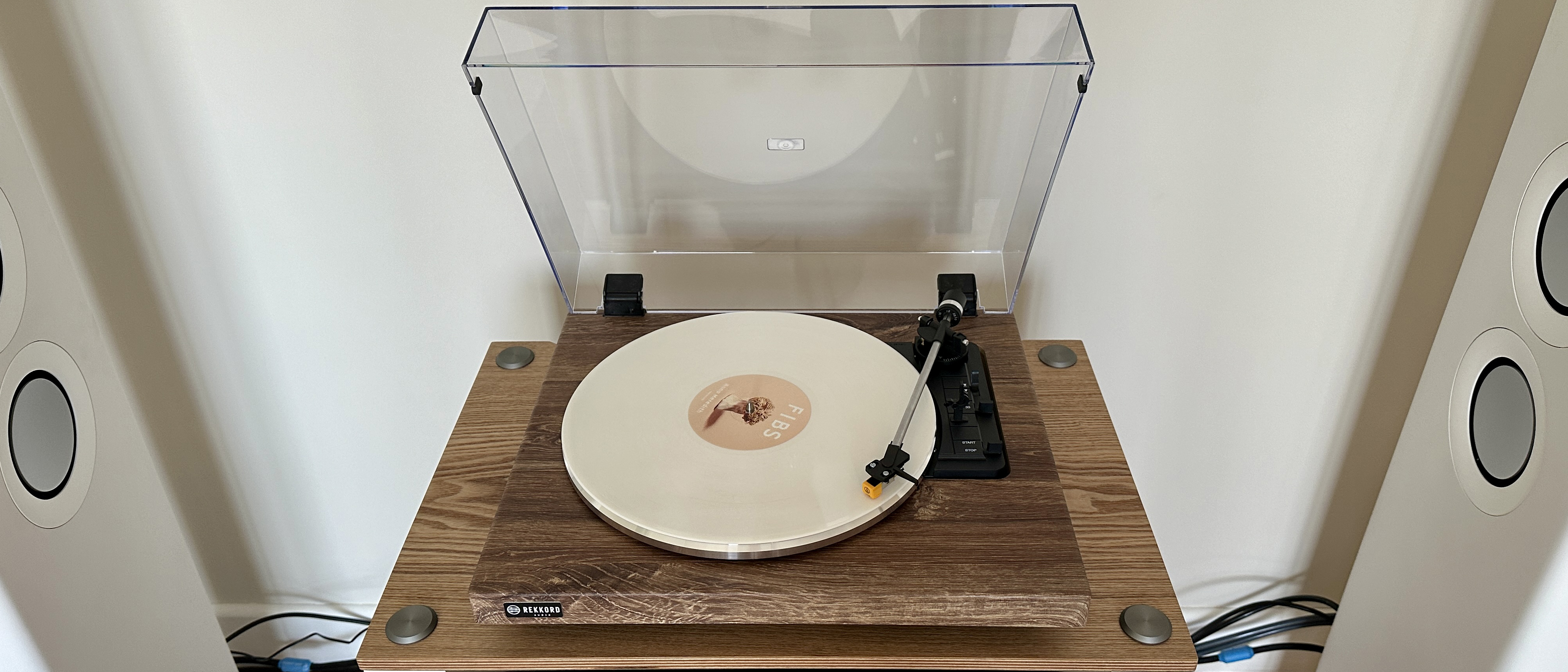TechRadar Verdict
There’s plenty to be said for ease of use where turntables are concerned. But unfortunately for the Rekkord Audio F300, it’s not the be-all and end-all.
Pros
- +
Fully automatic operation
- +
Good standard of build and finish
- +
Relaxed, flowing sound
Cons
- -
Short of sonic punch and drive
- -
Not especially upgradeable
- -
Some very worthwhile (though admittedly manual) alternatives
Why you can trust TechRadar
Rekkord Audio F300: Two-minute review
The idea that the man who operates turntable hero Pro-Ject might require another brand building and selling record players might seem an odd one – but Heinz Lichtenegger (for it is he) sees Rekkord Audio as the perfect method of filling in gaps in the Pro-Ject line-up. Specifically those gaps marked ‘automatic operation’.
So the Rekkord Audio F300 (hand-made, like the rest of the Rekkord Audio range, in the Black Forest) is a fully automatic turntable, arrives with its cartridge and even its belt pre-fitted, and is about as close to ‘plug and play’ as a product of this type ever gets. It’s properly built and finished, too – so the asking price seems absolutely fair enough.
Or. at least, it does until you get down to the business of actually ‘playing a record’. The F300 is a fine-sounding device in many ways – it’s detailed and forgiving, able to flow through rhythms and tempos with complete assurance, and creates a convincing soundstage on which the action can unfold.
But it’s ‘action’ that exposes the Rekkord Audio’s few shortcomings and marrs its bid to enter our best turntables buying guide. It’s not an especially dynamic listen when it comes to tracking shifts in volume or intensity, and it’s overtly short of outright ‘punch’ when it comes to describing bass sounds.
So ultimately it comes down to your own personal scenario. That there are more complete-sounding turntables available at this sort of money is undeniable. But if the fully automatic convenience of the F300 excites you (and that's understandable – nobody likes harming vinyl), it’s currently about as good as you’re going to get at the price.
Rekkord Audio F300 review: Price and release date
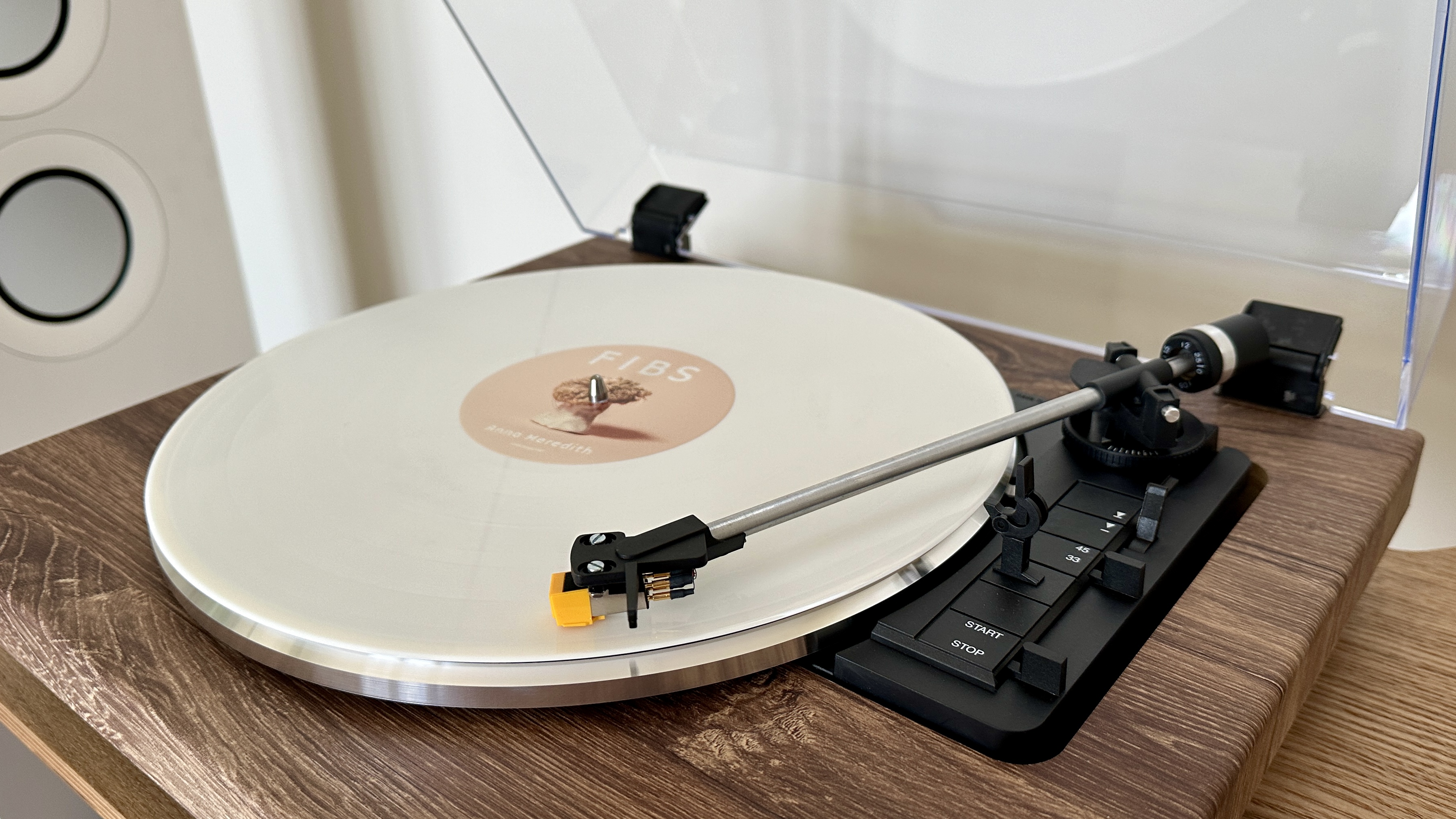
The Rekkord Audio F300 automatic turntable is on sale now, and in the United Kingdom it sells for £549. It’s available to American customers for $599, but currently no price is quoted for the Australian market – if exchange rates are anything to go by, you’re looking at AU$1,049 or something quite like it.
There's no shortage of well-regarded turntables from well-regarded brands available at this sort of money, chief of which might be the excellent ProJect Debut Carbon Evo. But Rekkord Audio reckons it has a worthwhile point of difference…
Rekkord Audio F300 review: Features
- Fully automatic operation
- Audio Technica AT91 moving magnet cartridge
- Captive RCA connections and grounding lead
The obvious feature, and the feature Rekkord Audio is understandably most pleased about, is its fully automatic operation. Hands not as steady as they used to be? Hand/eye coordination not all it might be? The F300 is here to help.
Better still, the F300 is not only fully automatic but it’s quiet and reliable with it. Set the controls to the desired rpm, and press the ‘start’ control – the Rekkord Audio takes care of the rest. About my only gripe concerns the F300’s insistence that 12in discs spin at 33.3rpm and 7in discs at 45rpm. So, anyone who wants to listen to a 45rpm 12in single will have to cue it up manually and take it off manually at the end of the side. Which takes a bit of the shine off the ownership experience, no two ways about it.
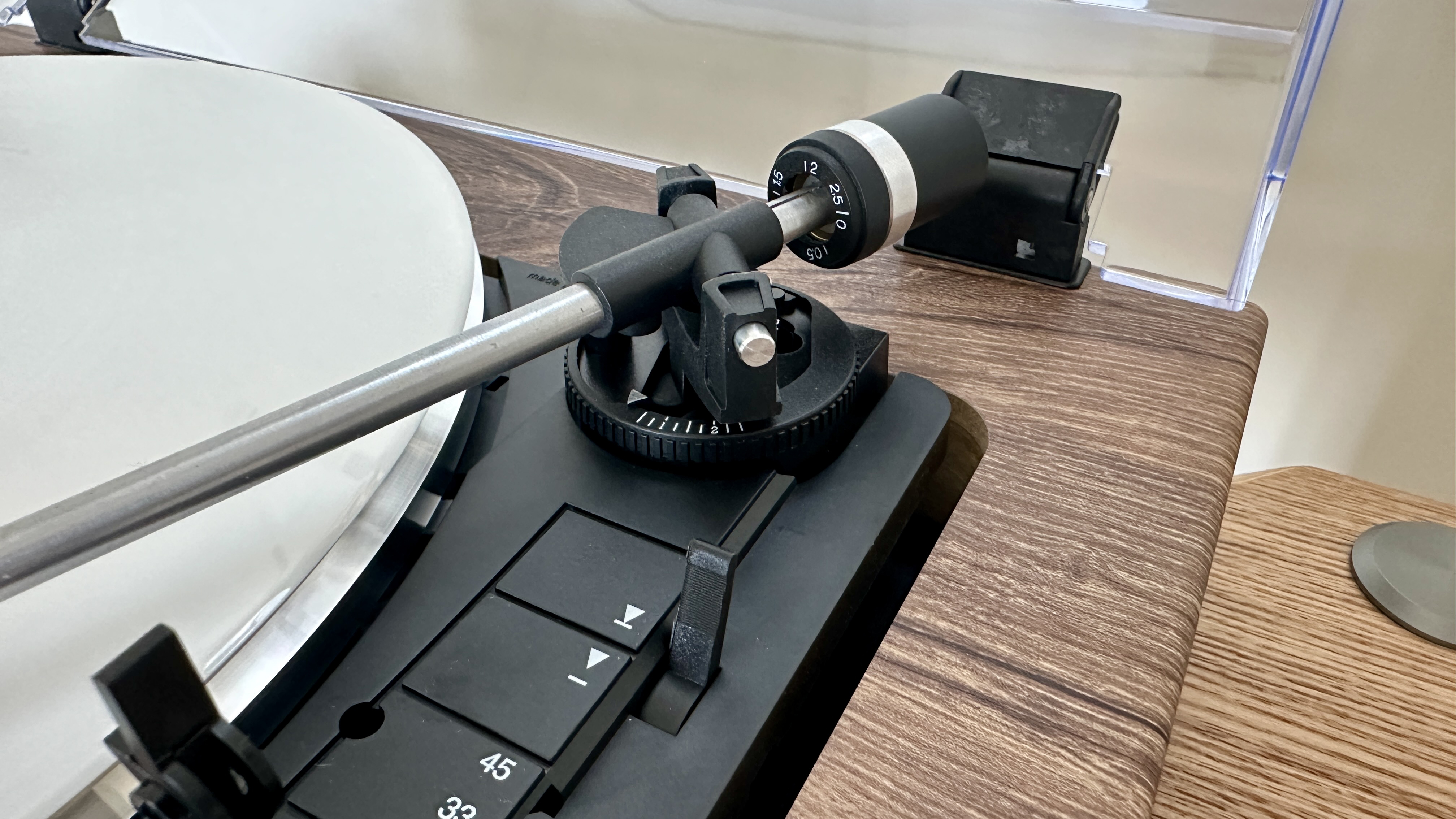
The F300 is hard-wired for stereo RCA and grounding wire connections, which adds to its ‘plug-and-play’ credentials but does mean you’ve no possibility of upgrading. The Audio Technica AT91 cartridge that arrives pre-adjusted and attached to the headshell that is, in turn, pre-attached to the 211mm low-mass aluminium tonearm is a very capable item – but again, it seems optimised for the role and upgrading doesn’t seem to have been factored in. Still, all you need to do is adjust tracking weight and dial in the appropriate anti-skate setting, and the F300 is good to go. Added to the automatic operation, it makes the whole ownership experience about as painless as it realistically can be. Even the belt that moves the aluminium platter is pre-fitted when you take the player out of its packaging.
- Features: 4.5/5
Rekkord Audio F300 review: Sound quality
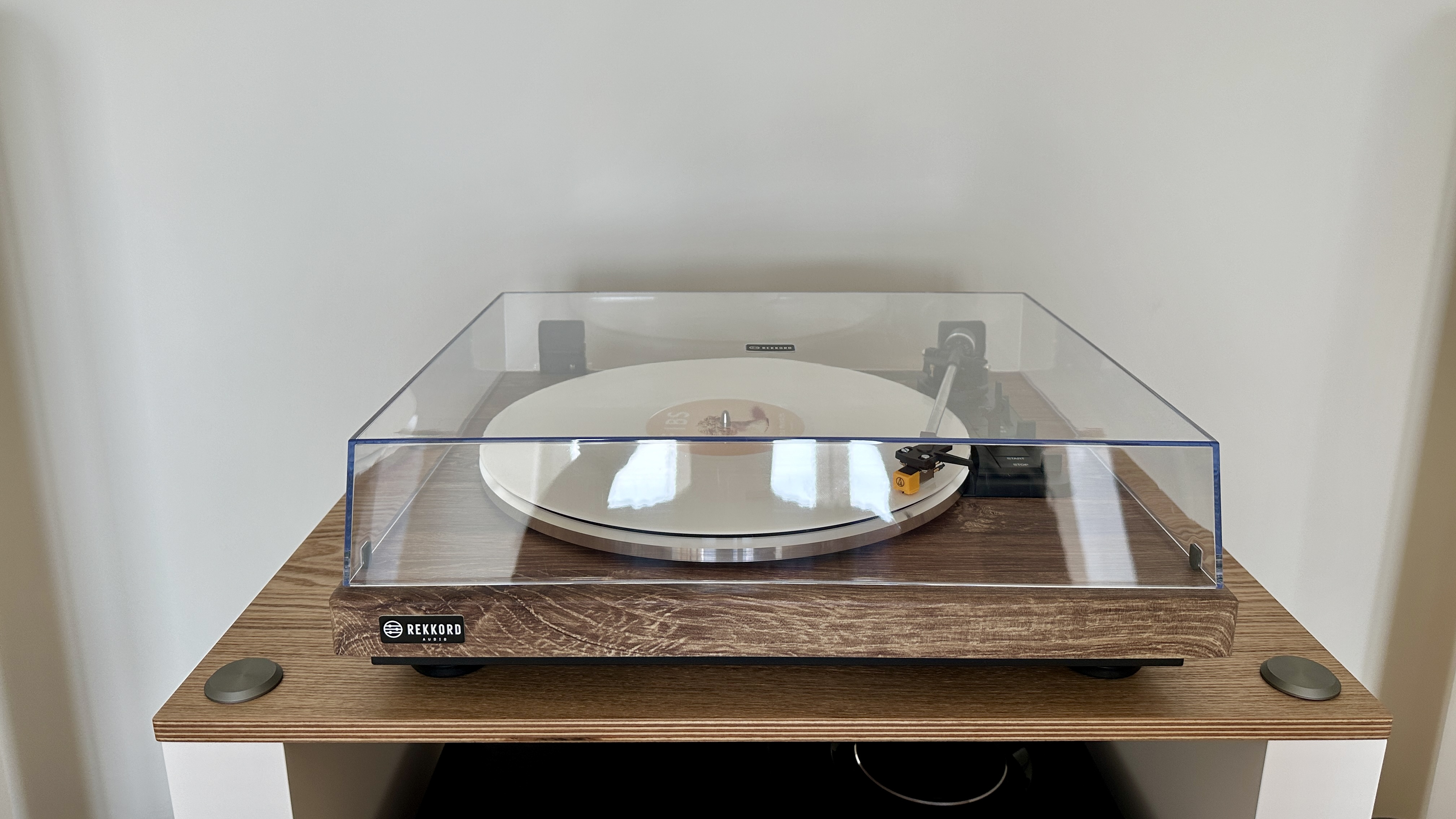
- Nicely tranquil and fluent sound
- Good detail retrieval and pleasant rhythmic expression
- Not especially dynamic or at all punchy
There’s a Paul Simon song that opens with the line, “Well, I’m accustomed to a smooth ride”. It seems unlikely to me that he is referencing the Rekkord Audio F300 (especially as the song in question is getting on for 35 years old), but nevertheless it sprang to mind when I first heard the F300 in action, and I haven’t been able to shift it.
Because if there’s one thing the F300 offers, it’s a smooth ride. In fact, you could do a lot worse than listen to something like The Rhythm of the Saints (the Paul Simon album from which that line is taken) if you want to hear the Rekkord Audio at its most comfortable and consequently at its best. It fairly glides along in the most natural and unforced manner, handling rhythms and tempos with a deft certainty, digging out plenty of detail at every stage and offering plenty of midrange insight. It has a fair amount of bite at the top of the frequency range, creates a large and plausible soundstage, and has a slightly-warmer-than-neutral tonality that suits the material well.
There’s a pleasing unity to its presentation, and it gives every aspect of the frequency range equal billing. It’s alert to even very minor details, and is able to contextualise them both in terms of their weighting and their position on the stage.
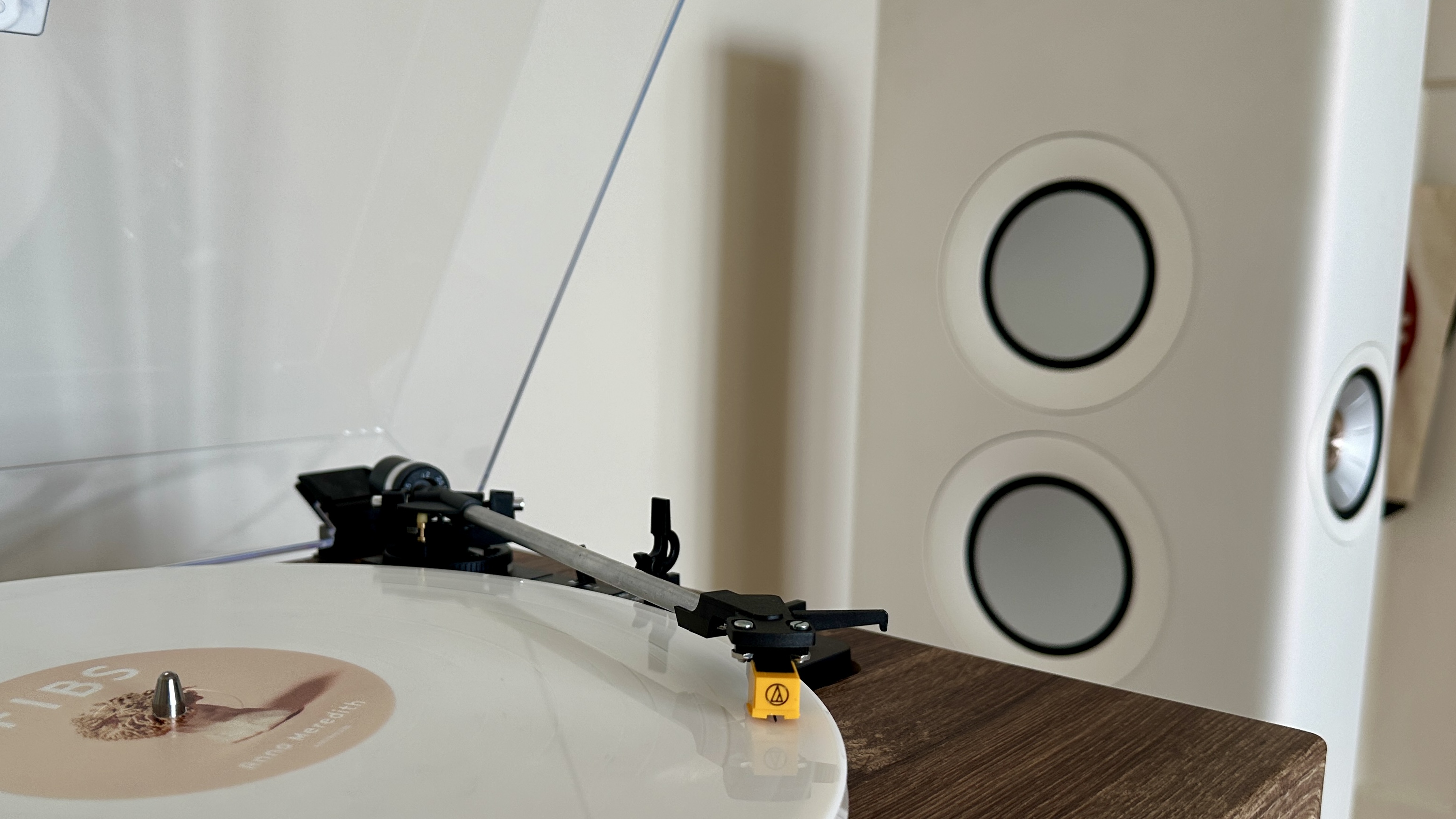
Unfortunately, it’s not even remotely difficult to take the F300 out of its comfort zone where it is, obviously, far less comfortable. A heavyweight reissue of Aphex Twin’s timeless Selected Ambient Works 85 - 92 makes the point in unequivocal fashion – the F300 may be alert to small dynamic variations in instruments or voices, but it’s not all that adept at dealing with the big dynamic shifts associated with changes in attack or intensity. The distance between the quietest and loudest moment of this record is no distance at all when described by the Rekkord Audio.
Equally problematic is the relative lack of low-end punch the F300 is able to summon. It has no problem expressing the rhythms of this recording with positivity, but the best it can summon is a sort of mild ‘shove’ where you just know the music wants to hit with greater determination. This lack of rigour, allied to the easy-going overall nature of the F300’s delivery, conspires to serve up a presentation that’s probably most politely described as ‘tepid’. Which is no one’s idea of what Aphex Twin should sound like, let’s face it.
- Sound: 3/5
Rekkord Audio F300 review: Design
- Perspex dust-cover
- Single-piece MDF plinth
- Decoupled sub-chassis
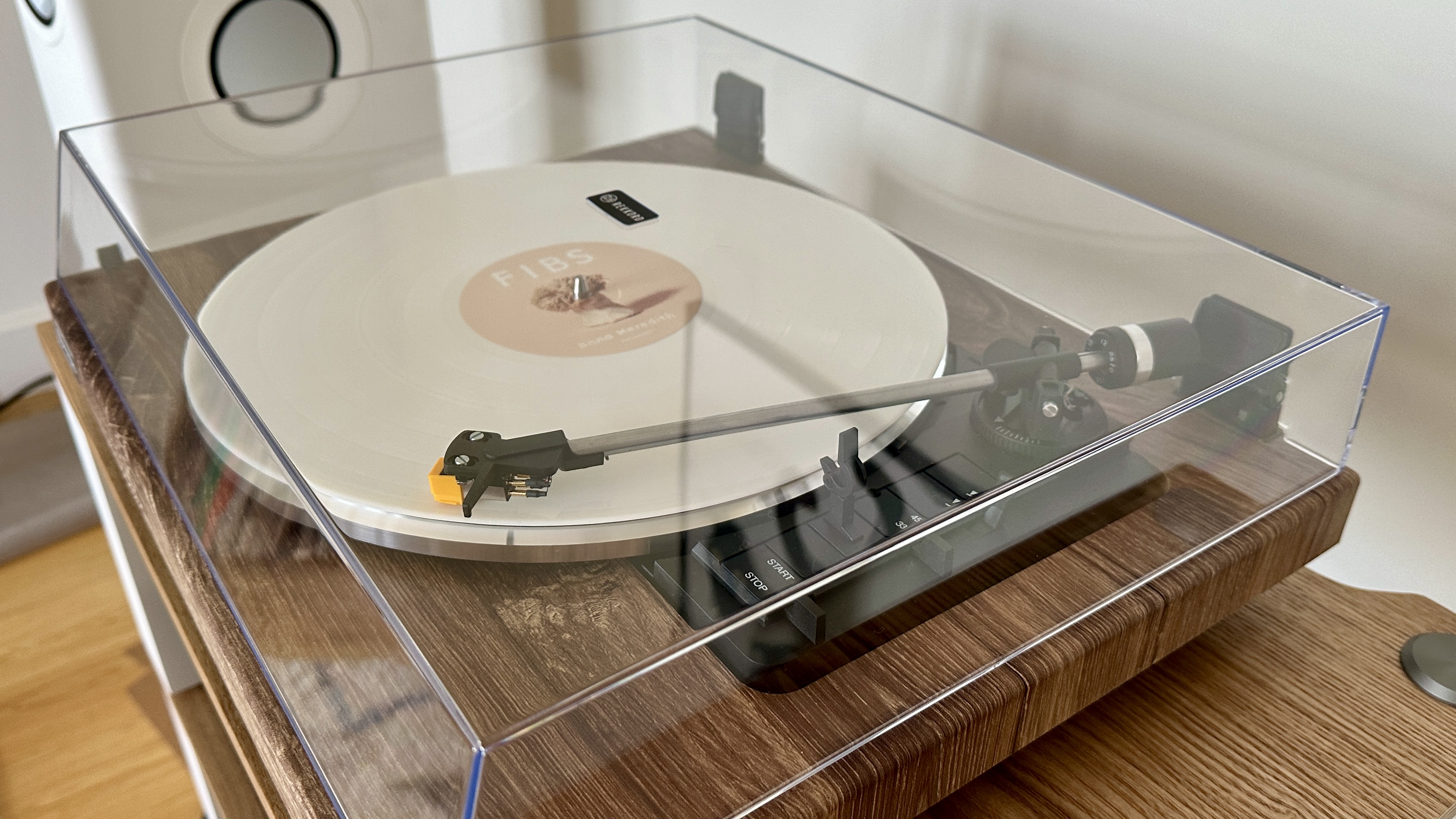
It’s not easy to make a mainstream record player look anything other than ‘a rectangle with a circle on it’ – and Rekkord Audio hasn’t tried. The F300 looks exactly as you might expect, in a good way.
It’s very nicely built and finished, though, and feels the part just as much as it looks it. The three available finishes (satin black or silver are available as well as the ‘stirling oak’ wood veneer of my review sample) look good, and in the case of the wood veneer model there’s a degree of tactility in the fairly deep grain, too. The plinth is of a single, relative chunky, piece of MDF – a material valued for its rejection of resonances – and the clear Perspex dust-cover on top of it is mildly angled and consequently mildly interesting in visual terms.
The F300 is distinct from the less expensive models in the Rekkord Audio line-up thanks to the floating sub-chassis that’s visible beneath the aluminium platter. The platter itself, the tonearm assembly and the components that control the automatic operation are all decoupled from the main body of the chassis – and so the theoretical benefits where isolation from internal and external vibrations are obvious.
- Design: 4.5/5
Rekkord Audio F300 review: Usability and setup
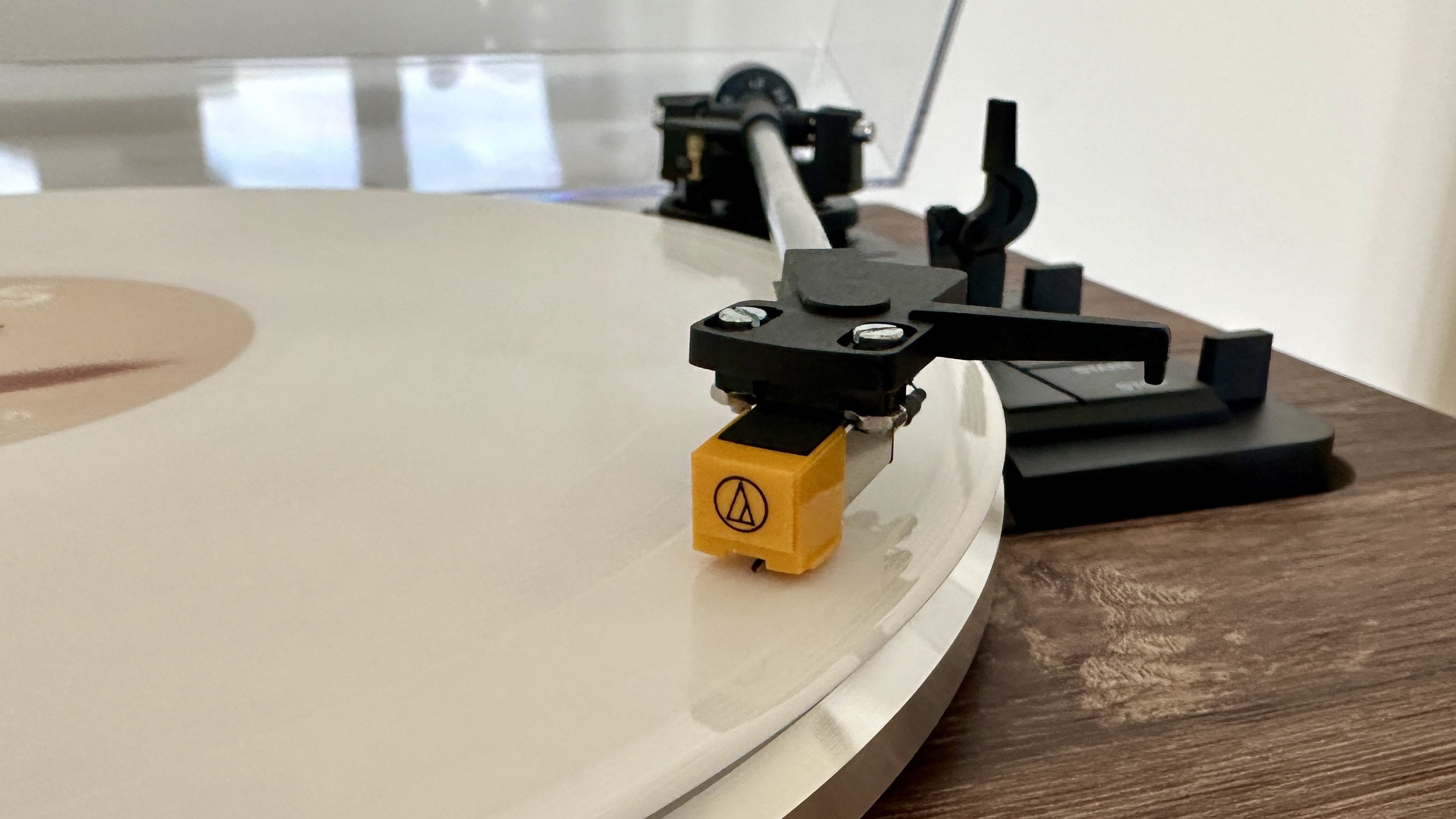
- Minimal user input into set-up
- Even more minimal input needed when playing a record
- ...Sit back and listen
It’s hard to know how setting up or operating the F300 could be any simpler or more straightforward. If you can’t get a sound out of this record player within minutes of taking it from its box, you should probably have a word with yourself.
There’s a wall-wart mains adapter in the packaging that needs to be plugged in. The captive RCA leads and grounding lead need to be attached to your amplifier, wireless speaker or what-have-you. The aluminium platter needs positioning, the counterweight needs adjusting – as does the anti-skate control. And then you just need to take the plastic guard off the cartridge. You are now set up.
And, of course, the whole point of the F300 relative to most of its rivals is its ease of usability. Select the speed at which you’d like the platter to turn. And then, having put a record on the platter, push ‘start’. The job is very much done.
- Usability and setup: 5
Rekkord Audio F300 review: Value
As a painless-to-own, easy-to-use turntable that’s properly built and finished, it’s difficult in the extreme to fault the value that Rekkord Audio is offering with the F300. Whether or not it sounds like the money’s-worth is, admittedly, a slightly different question - the answer will depend quite strongly on whether you consider the words “laid back” to be especially positive or not…
Should I buy the Rekkord Audio F300?
Buy it if...
You value convenience
The F300 is as convenient as they currently come.
You admire good engineering
There’s no arguing with the quality of construction here, nor the standard of the engineering involved.
You like an easy-going sound
To be honest, ‘easy-going’ is to understate it somewhat.
Don't buy it if...
You own a lot of 12in singles
Rekkord Audio is adamant: 12in records turn at 33.3rpm, 7in records at 45rpm.
You enjoy upgrading your equipment
The captive leads and the cosy nature of the relationship between tonearm and cartridge don’t lend themselves to upgrades.
You admire a punchy sound
You have a stack of choice if you want a more assertive-sounding turntable. None of the alternatives are automatic, though.
Rekkord Audio F300 review: Also consider
If it’s the automatic operation that’s brought you this deep into the Rekkord Audio F300 review, you won’t find too many alternatives that perform to this sort of standard. If, however, you’re simply in the market for the best-sounding turntable this sort of money can buy, you most definitely have options – Pro-Ject and Rega (see in particular the Rega Planar PL1) are probably the most high-profile turntable brands with very capable machines at this sort of price.
How I tested the Rekkord Audio F300
I plugged its captive RCA connections into my Naim Uniti Star amplifier via a Cambridge Audio phono stage, from where it played through a pair of Audiovector QR-1 SE loudspeakers, and also into the ‘aux’ input of a KEF LS60 wireless speaker system. I played 12in and 7in records of all types, all vintages and various conditions (although I steered clear of those LPs it appears someone has been eating off). And I didn’t stop for the thick end of a week.
- First reviewed: August 2024
- Read TechRadar's Reviews Guarantee
Simon Lucas is a senior editorial professional with deep experience of print/digital publishing and the consumer electronics landscape. Based in Brighton, Simon worked at TechRadar's sister site What HiFi? for a number of years, as both a features editor and a digital editor, before embarking on a career in freelance consultancy, content creation, and journalism for some of the biggest brands and publications in the world.
With enormous expertise in all things home entertainment, Simon reviews everything from turntables to soundbars for TechRadar, and also likes to dip his toes into longform features and buying guides. His bylines include GQ, The Guardian, Hi-Fi+, Metro, The Observer, Pocket Lint, Shortlist, Stuff T3, Tom's Guide, Trusted Reviews, and more.
